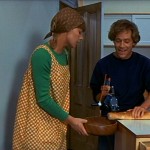
A Touch of Class – 1973
I’m not sure exactly what I was expecting when it came to this movie. I knew very little going into it except that it starred George Segal and Glenda Jackson, and that it was a romantic comedy. Beyond that, it could have been anything. What I got was a quirky situational comedy that was very character driven. The nature of the romance was questionable, at best, and the plot, at times, had me rolling my eyes.
But was it a bad movie? No, it wasn’t. It just wasn’t the poignant drama or the sweeping epic that I have grown to expect from a Best Picture nominee. I thought that this kind of candidate had gone away in the early 40s. George Segal played Steve Blackburn, a business executive working in London. Apparently, he regularly cheats on his wife as much as he can. He meets Vickie Allessio, played by Glenda Jackson. She has a good job that keeps her busy, two kids, a divorce, and a non-existent sex life. The two meet and hit it off.
The plot is remarkably simple. The two start a causal affair but end up falling in love. In the end, they realize that they want different things. He wants the occasional rendezvous, and she wants companionship. He wants a secret mistress, and she wants a permanent relationship. Though they love each other, they eventually part ways, knowing that the end of the affair is for the best. However, it is interesting to note that in the last minute or so of the movie, Steve seems to come to a decision which makes him happy, though it is never really revealed what that decision might have been. It is possible he might have decided to leave his wife to be with Vickie.
I’d like to think that I am a pretty liberal guy, but the main problem I had with the film was a moral one. The film seemed to look at marital cheating as perfectly acceptable, at least from the man’s point of view. It’s absolutely normal to mess around outside of your marriage, just as long as you don’t fall in love with the girl. Is this the way people thought in the 70s? Were they ok with this concept? Steve went out of his way to cheat on his wife on a regular basis, and even when his friend Walter Menkes, played by Paul Sorvino catches him in the act, he encourages Steve to continue the affair as long as he remains emotionally detached. Again, Paul tells of his own affair in which he made the mistake of falling in love with his mistress.
And while I’m on the subject, I have to point out that I didn’t like Steve’s character at all. Steve was a class-one, grade-A jerk! Not only is he a cheater, he is self-centered, childish, volatile, and an egotistical liar. He is both overly sensitive and insensitive towards others. Conversely, I liked the character of Vickie very much. She was smart, confident, pragmatic, and thick skinned. She seemed to know exactly what she wanted out of the affair, and what she didn’t want.
They take a trip to Spain together for their first real tryst. After their first time making love, Steve says he felt the earth move. Vickie says that it was “very nice.” Suddenly, the notion that his sexual prowess has failed to impress her offends Steve’s ego, causing him to blow up at her. He goes from thoroughly enjoying her to hating her in a matter of seconds. After that, I could no longer take him seriously. She tolerates his infantile behavior for only a short time before fighting back and calling him on his typically American shortcomings.
Their arguments increase and increase until they both lose control in the hotel room. In a wacky scene, the two begin throwing the contents of their suitcases at each other, along with anything else they can get their hands on, half of which ends up hitting the hapless bellhop. But in the most unrealistic, but often used movie trope, the fighting gets the two lovers so worked up that they end the battle by having passionate sex. Still, I suppose that it wasn’t any sillier than anything else that happened in the movie.
Jackson really did a good job. Her acting was spot on, and she, in fact, won the Academy Award for Best Actress that year. And it was she who, I think, really carried the film’s dramatic content. As the affair dies, she seems to get the short end of the stick. Longing for more permanent companionship, she goes out of her way to keep the relationship going, but he simply doesn’t have enough free time to give her what she needs. He breaks things off through a telegram and she leaves. She sheds a few tears, but seems ultimately undamaged but the affair’s demise. Jackson played the part realistically and believably.
I wouldn’t say that A Touch of Class was a bad film, but I don’t think I would classify it as anything more than average. I enjoyed it for what it was, but I wasn’t able to see anything in it that set it above any other movie. The comedy was mildly amusing, the romance was present, though not especially passionate, and the drama wasn’t very intense. Still, I’ll admit that it held my interest for an hour and 46 minutes.









I ushered at the galleria in Houston when the film came out. I memorized every line and enjoyed it tremendously, but what did I know? I wasn’t a film critic. Those were happy times, innocent you might say, even though story line was about a guy cheating on his wife. Watch the Academy Awards and response from other contestants when Glenda Jackson won. All that love went to?